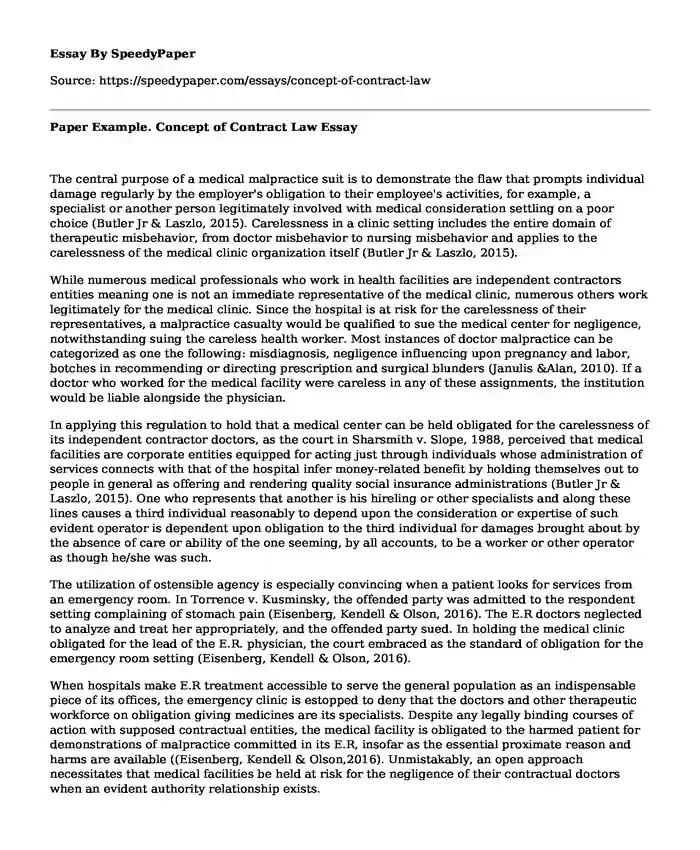
| Type of paper: | Article review |
| Categories: | Organizational behavior Healthcare policy Employment law |
| Pages: | 3 |
| Wordcount: | 604 words |
The central purpose of a medical malpractice suit is to demonstrate the flaw that prompts individual damage regularly by the employer's obligation to their employee's activities, for example, a specialist or another person legitimately involved with medical consideration settling on a poor choice (Butler Jr & Laszlo, 2015). Carelessness in a clinic setting includes the entire domain of therapeutic misbehavior, from doctor misbehavior to nursing misbehavior and applies to the carelessness of the medical clinic organization itself (Butler Jr & Laszlo, 2015).
While numerous medical professionals who work in health facilities are independent contractors entities meaning one is not an immediate representative of the medical clinic, numerous others work legitimately for the medical clinic. Since the hospital is at risk for the carelessness of their representatives, a malpractice casualty would be qualified to sue the medical center for negligence, notwithstanding suing the careless health worker. Most instances of doctor malpractice can be categorized as one the following: misdiagnosis, negligence influencing upon pregnancy and labor, botches in recommending or directing prescription and surgical blunders (Janulis &Alan, 2010). If a doctor who worked for the medical facility were careless in any of these assignments, the institution would be liable alongside the physician.
In applying this regulation to hold that a medical center can be held obligated for the carelessness of its independent contractor doctors, as the court in Sharsmith v. Slope, 1988, perceived that medical facilities are corporate entities equipped for acting just through individuals whose administration of services connects with that of the hospital infer money-related benefit by holding themselves out to people in general as offering and rendering quality social insurance administrations (Butler Jr & Laszlo, 2015). One who represents that another is his hireling or other specialists and along these lines causes a third individual reasonably to depend upon the consideration or expertise of such evident operator is dependent upon obligation to the third individual for damages brought about by the absence of care or ability of the one seeming, by all accounts, to be a worker or other operator as though he/she was such.
The utilization of ostensible agency is especially convincing when a patient looks for services from an emergency room. In Torrence v. Kusminsky, the offended party was admitted to the respondent setting complaining of stomach pain (Eisenberg, Kendell & Olson, 2016). The E.R doctors neglected to analyze and treat her appropriately, and the offended party sued. In holding the medical clinic obligated for the lead of the E.R. physician, the court embraced as the standard of obligation for the emergency room setting (Eisenberg, Kendell & Olson, 2016).
When hospitals make E.R treatment accessible to serve the general population as an indispensable piece of its offices, the emergency clinic is estopped to deny that the doctors and other therapeutic workforce on obligation giving medicines are its specialists. Despite any legally binding courses of action with supposed contractual entities, the medical facility is obligated to the harmed patient for demonstrations of malpractice committed in its E.R, insofar as the essential proximate reason and harms are available ((Eisenberg, Kendell & Olson,2016). Unmistakably, an open approach necessitates that medical facilities be held at risk for the negligence of their contractual doctors when an evident authority relationship exists.
References
Butler Jr, J. E., & Laszlo, S. S. (2015). Hospital Liability for Physician Negligence in Georgia: A Realistic Approach. Mercer L. Rev., 37, 701.
Eisenberg. C., Kendell & Olson (2016). Holding Hospitals Liable for the Negligence of Their Non-Employee Physicians. https://www.eckolaw.com/blog/2016/september/holding-hospitals-liable-for-the-negligence-of-t/
Janulis, D. M., and Alan D. H. (2010). Damned if you do, damned if you don't: Hospitals' liability for physicians' malpractice. Neb. L. Rev. 64 689
Cite this page
Paper Example. Concept of Contract Law. (2023, Mar 26). Retrieved from https://speedypaper.com/essays/concept-of-contract-law
Request Removal
If you are the original author of this essay and no longer wish to have it published on the SpeedyPaper website, please click below to request its removal:
- Free Essay Example: My First Car
- Free Essay on Why Drivers' Education Should Be Put into the Schools' Curriculum
- A New Historicism Approach To James Joyce's Araby - Essay Sample
- Export Strategy Essay Sample from Our Database
- Franz Liszt - Biography Essay Sample
- Essay Example on the Implication of Maintaining a Zoo
- Essay Sample on Teamwork and Collaboration for Patients With Diabetes
Popular categories




